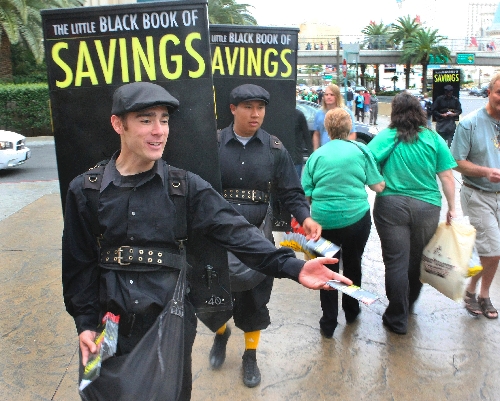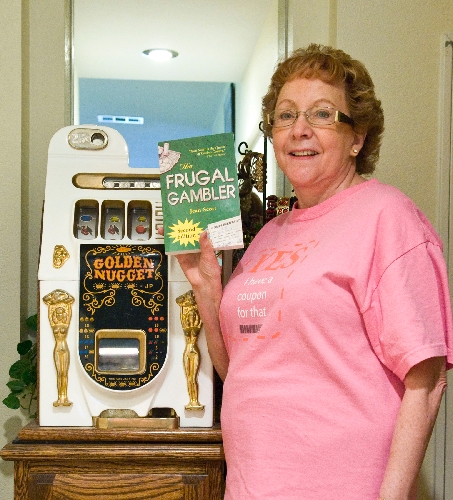Third parties taking over discounts at many casinos


About 15 years ago, during her days as a Las Vegas tourist, Jean Scott walked miles along the Strip just to redeem a coupon.
A doughnut and coffee at the Westward Ho — free with a coupon from the casino’s funbook – started off her day, providing the fuel she needed for her trek. Scott and her husband went anywhere and everywhere to get, and then redeem, a coupon for everything from complimentary buffets at Bally’s to $10 cash at the Tropicana. All for just walking through the casino’s doors, no strings attached. Sometimes, the coupon crawl was more lucrative than gambling.
“I was first called the Queen of Coupons because coupons were our bread and butter,” says Scott, who is now a local and known as the Queen of Comps. She has published several “Frugal Gambler” guidebooks on how to get the most value out of Las Vegas casinos.
Freebies and funbooks — booklets full of coupons — have long been used by casinos to create the impression that the Strip is a place where you can get something for nothing. But those days are gone. Now, if you want something for nothing, you’ll have to pay for it.
“Why did tchotchkes go away? Because they weren’t that strong,” says Anthony Curtis, publisher of the Las Vegas Advisor. “Who’s going to walk into your casino for a pen these days? And how many bottle openers do you need?”
Casinos used to see great value in giving visitors something free with their logo on it — pens, mugs, T-shirts, key chains — as a way for you to remember them, Curtis says.
Now, they would rather remember you.
“The idea,” Curtis says, “is they want to get your name on their database.”
In recent years, several changes on the Strip brought about the near-demise of the free freebie. There still are a few out there; you can always get a string of beads and some coupons at the Rio’s Masquerade Show in the Sky, for instance. But the decks of cards that casinos once handed out with abandon have been put on sale in the gift shop.
Some properties that targeted the value customer — such as Westward Ho – have closed. Others rebranded as luxury resorts, and coupons just didn’t fit with their images.
“Upscale properties … didn’t like the idea of a funbook,” Curtis says. “It wasn’t palatable to them. That’s why it changed. They had invested more in their players club technology, which is nothing more than database marketing. As that rose,” the no-strings-attached freebie declined.
Still, couponing survives. Several casinos, including Terrible’s, Casino Royale, New York-New York and Planet Hollywood, give out coupon books that offer discounts on food, credit for play on slot machines and other items. A free gift or a funbook full of coupons usually are offered to people signing up for casino players clubs.
But much of today’s couponing is done by third parties, such as Curtis. In the mid-1990s, he recognized an opportunity to offer discounts to his members as a bonus or incentive for signing up to receive his Las Vegas Advisor newsletter. His coupon book, which goes out annually to members, is full of discounts, including $50 off anything at the Palms, a free round of drinks at Ellis Island, free buffets and other offers. “The third party coupons are very strong for casinos because we do an awful lot of marketing for them,” Curtis says. “We’re able to put some strong values in the (Members Rewards Book). The way we get the (values) is we don’t charge the casinos. We make our money through subscriptions.”
Tom Letizia, founder of Letizia Mass Media, which operates mobile billboards that drive around town and on the Strip, jumped into the funbook market in December with the Little Black Book of Savings. He distributes 50,000 of them each month through people who walk the Strip wearing signs and handing out the booklets. The Wobis, or walking billboards, are a throwback to the old days, when casinos hired people to stand on the sidewalk and hand out coupons.
“They’re very well-received,” Letizia says. “People want these books because they feel like they’re getting something of value. We tell our clients they need to put something special in there that will entice people to go to their property.”
Among the offerings are a coupon for a 75-cent bottle of beer or margarita at Casino Royale and discounts on Madame Tussauds.
Steve Bourie, author of the American Casino Guide, provides coupons in the back of his book, which retails for $18.95. He remembers the early 1990s, when a visitor could grab a funbook and get free hot dogs at Slots O’ Fun or free slot pulls at several casinos.
Now the coupons in his book are for match play at off-Strip resorts; two-for-one coupons for meals at the Eiffel Tower restaurant in Paris Las Vegas and food discounts at Margaritaville in the Flamingo Las Vegas.
The economy hurt the freebie market, too, Scott says. Several casinos reined in their promotions while others expanded theirs. The Palms sends out coupon booklets through the mail on a regular basis. The most recent one offers several two-for-one meals and a free picnic basket. But the majority of those deals require that you gamble to receive them.
The coupon book of yesteryear, when you didn’t have to invest money to get something for free, probably is gone for good, Scott says. But casinos seem to find new ways to connect with consumers. When Scott was in the Hard Rock Hotel recently, she noticed a sign advertising a text message freebie program. Provide the hotel with your cell phone number and receive deals by text. The Rio offers a similar option.
“A lot of casinos have been a little slow into getting into the social networking things,” Scott says. “I think it is going to take the place of the funbooks, because you’re right there on site and it’s just a more modern way to do it.”
Contact reporter Sonya Padgett at spadgett@ reviewjournal.com or 702-380-4564.












